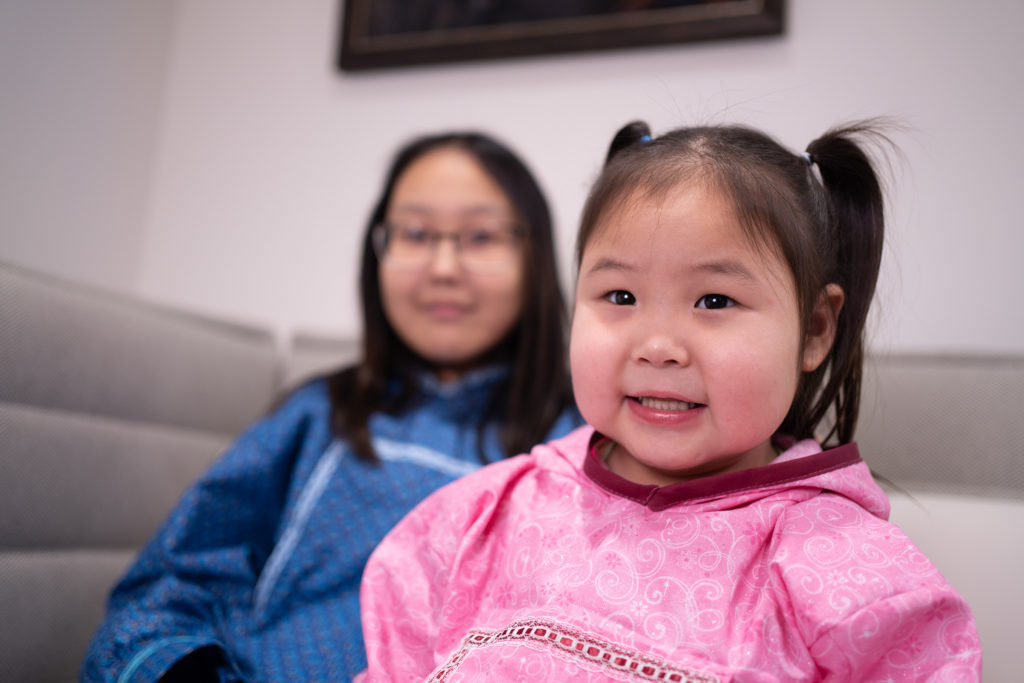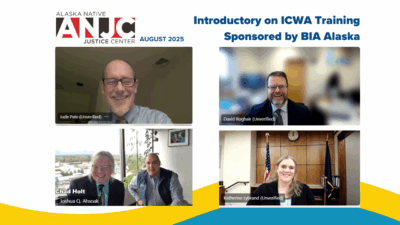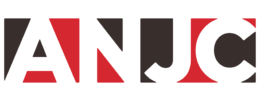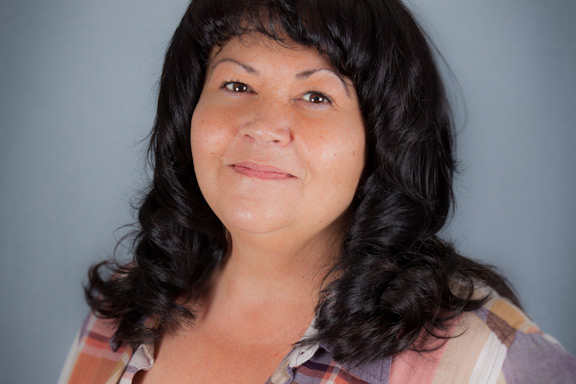
ANJC represents and advises Alaska Tribes in State Child of Need Aid (“CINA”) cases where the Indian Child Welfare Act (“ICWA”) applies. Despite some progress, the State continues to fall far short of fulfilling the promise of ICWA to keep Alaska Native children safe and connected to our Alaska Native cultures. ANJC helps ensure State child protection matters comply with the ICWA.
ICWA is recognized as the gold standard in child welfare practice. The ICWA promotes the best interest of our Alaska Native children by keeping them connected to our cultures, extended families, and Tribes, which are proven protective factors.
All Alaska Tribes with an ICWA case in an Alaska State Court in the Southcentral region are eligible for representation.
Services
We provide:
- Court representation in many areas of the state
- Advice to Tribes statewide
- Training and support for Tribal ICWA Workers
For more information, please contact our ICWA team.
Trainings
Tribal Training Request Form
Training request approval will be subject to staff availability. If we are unable to offer an in-person training to your Tribe or organization, we may be able to provide a virtual training, subject to availability. Please return your completed Tribal Training Request form to icwa@anjc.net
ICWA Introductory Training for Tribes
ANJC offers introductory and advanced ICWA trainings throughout the year for Tribes. These trainings are sponsored by the BIA Human Services, Alaska Region. The schedule for trainings in 2026 will be posted on this website soon. For individual training requests for Tribes, please feel free to email the Tribal Training Request Form available on this page to icwa@anjc.net.
Recent Successful Trainings

For further inquiries or information, please contact ANJC at (907) 793-3550 or icwa@anjc.net.
Resources for Tribes
- Indian Child Welfare Act Training Videos
- Desk Reference for Alaska Tribal Workers in ICWA Cases (PDF)
This guide is intended for Alaska Tribal staff working on state cases involving the Indian Child Welfare Act. It includes a mix of information and rules from state and federal law, court rules, and OCS policy.
- Tribal Agreement – Tribes may sign the attached Tribal Agreement. This allows OCS to share any documentation from the Online Resource for the Children of Alaska database (ORCA) prior to discovery on cases involving tribal members/families. ORCA is the main database used by OCS. A list of other villages who have signed confidentiality agreements is available here: https://dfcs.alaska.gov/ocs/Pages/confidentiality.aspx
- Contacts for the OCS Indian Child Welfare & Tribal Programs Staff: https://dfcs.alaska.gov/ocs/pages/icwa/contact.aspx
ICWA Specialists are the OCS regional experts on ICWA. Please contact the OCS ICWA Specialist in your region if you’re not sure who to talk to from OCS about an open CINA case. - Reordering Placement Preferences for Tribal Clients: We recommend that all of our Tribal clients adopt a resolution to ensure that the Tribe, and only the Tribe, can legally designate the first placement priority under the Indian Child Welfare Act. Please see the attached Tribal Resolution, as well as further guidance on reordering placement preferences as a suggested resolution. Reordering the placements under the Indian Child Welfare Act ensures that the Tribe’s wishes for placement are recognized before all other preferences.
FAQ
The ICWA is a federal law that sets out rules that state courts must follow in child welfare cases where American Indian/Alaska Native children are removed from their home.
The ICWA is designed to keep Alaska Native children connected to their families and Tribes, which serves the best interests of Alaska Native children. The ICWA also recognizes Tribes’ right to participate in these child welfare cases.
The ICWA applies to Alaska Native children that are either:
- a citizen (member) of an Indian tribe; or
- an eligible for citizenship (membership) in an Indian tribe and the biological child of a citizen of an Indian tribe
The ICWA was passed in 1978 because Congress was alarmed by the large numbers of Native children who were being separated from their parents, extended families, and Tribes by states.
Congress intended that ICWA would “protect the best interests of Indian children and to promote the stability and security of Indian tribes and families” (25 U.S.C. § 1902).
ICWA requires the State Child Protection Agency (Office of Children’s Services) to:
- Provide active efforts and resources to try to reunify the family
- Identify a placement that fits under the ICWA preference provisions
- Notify the Native child’s Tribe of the state court case
- Work actively to involve the child’s Tribe in the case
Alaska Native children are more likely to be removed from their home and placed in out of home care. The state ensures that parents and OCS are provided attorneys in Child in Need of Aid (CINA) cases involving the ICWA.
Tribes are the only party not provided an attorney. ANJC ensures the Tribes’ voice is clearly heard in Court.
ICWA is most effective when the Tribe is actively involved in the Court proceedings through a Tribal representative (ICWA worker or attorney).
While an attorney is certainly not required for Tribes to be involved in a child protection proceeding, we believe that a Tribal attorney amplifies the Tribes voice and allows the Tribal ICWA worker to concentrate on assistance to the Tribal family and children.
No. ANJC only represents Tribes. Every parent is entitled to a Court appointed attorney if they cannot afford to hire an attorney.
Yes. We help all 229 Alaska Tribes.
Review and sign an Engagement Letter with ANJC and have your Tribal Council sign a Resolution agreeing to work with ANJC on Child in Need of Aid (CINA) cases and for providing Training and Technical Assistance (“TTA”). If you’re interested in ICWA or Tribal Justice assistance at ANJC and would like an Engagement Letter and Template Tribal Resolution, please submit your request to icwa@anjc.net.
Our services are at no cost to Tribes.
ANJC will serve as the Tribe’s attorney in Child in Need of Aid (CINA) cases in which the Tribe requests representation and ANJC agrees to accept. ANJC will also provide Training and Technical Assistance (“TTA”) to strengthen the Tribe’s justice system. ANJC may decline to accept new cases and TTA requests in its sole discretion.
The Tribe authorizes ANJC to communicate and take direction from the Tribe regarding this representation through the ICWA worker or other designated person. If the designated contact becomes unavailable, the Tribe agrees to promptly designate a new point of contact and notify ANJC in writing.
The attorney-client relationship is a confidential relationship built on mutual trust. Our attorneys have a duty to attempt to achieve the Tribe's goals, advance the interests of the Tribe and be the Tribe's voice in Court and other forums.


